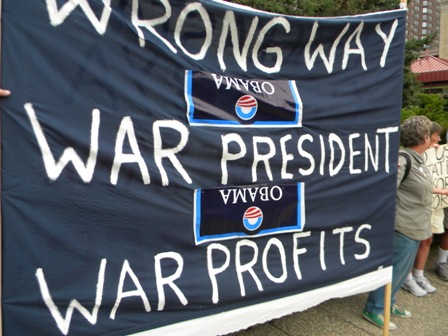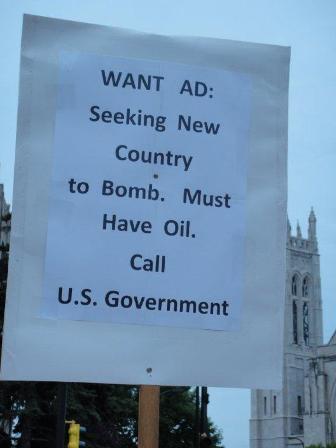The discovery of old intelligence files in Tripoli is yet another example of hypocrisy and America’s extremely shortsighted foreign policy. While Libyan and American intelligence sharing and cooperation was not a secret, the cache of files reveals how deeply connected the CIA and the Libyan Intelligence Agency were. Colonel Gaddafi, a self proclaimed fighter of imperialism, took part in the extradordinary rendition programs that were harshly criticized by human rights organizations [.pdf]:
[H]undreds of other people are still deprived of their liberty, under American authority but outside the national territory, within an unclear normative framework. Their detention is, in any event, altogether contrary to the principles enshrined in all the international legal instruments dealing with respect for fundamental rights, including the domestic law of the United States (which explains the existence of such detention centres outside the country). The following headline appears to be an accurate summary of the current administration’s approach: prefers to interrogate bigger fish in terrorism cases rather than charge them.
The report made no mention of Libya, suggesting that rendition in Libya was very much a well kept secret. The documents also suggest that Gaddafi began the renditon program in 2004 after he came clean about “unconventional weapons” and spoke about the dangers of them. It appears that many of those who were renditioned were memebers of the Libyan Islamic Fighting Group (LIFG). The LIFG was loathed by the Gaddafi regime, especially after an assassination attempt in 1996. Fearful of their links with al-Qaeda and cals for an Islamic state, Gaddafi ruthlessly cracked down on the group. It does not appear, therefore, that Gaddafi was an unwilling participant in the rendition program.
What is really interesting, however, is just how shortsighted American foreign policy has been. Gaddafi, who was relentlessly villified until he changed his bad habits, was pragmatically used as an ally in the neverending War on Terror. The tit for tat games played with Moammar abruptly came to an end during the Arab Spring when the United States and NATO seized the opportunity to oust the not so reliable dictator. Just like the Taliban were American allies during the Red Scare and are now mortal enemies in the midst of a decade long war, former enemies that endured the American-Libyan rendition program are now allies. Particularly alarming are the seedy “allies” that the United States now has:
Two days later, an officer faxed the Libyans to say that Mr. Sadiq and his pregnant wife were planning to fly into Malaysia, and the authorities there agreed to put them on a British Airways flight to London that would stop in Bangkok. “We are planning to take control of the pair in Bangkok and place them on our aircraft for a flight to your country,” the case officer wrote.
Mr. Bouckaert of Human Rights Watch said he had learned from the documents that Sadiq was a nom de guerre for Abdel Hakim Belhaj, who is now a military leader for the rebels.
As Pepe Escobar noted last week, Belhaj is a former al-Qaeda asset and he, along with his militia of Berbers proved to be the most efficient fighting force in the Libyan conflict. A mujahideen in Afghanistan during the Russian occupation, Belhaj was undoubtedly a recipient of loads of weapons and other assistance provided by the American government. In addition to this, Belhaj and the “Tripoli Brigade” were covertly trained by US special forces for two months, hence the group’s lethality. Training and arming such men with extensive contacts to al-Qaeda and other terrorist organizations such as the LIFG hardly seems to fit the spirit of the Arab spring, democracy and freedom. Lest it’s forgotten, the Zetas that are wreaking havoc on behalf of the drug cartels in Mexico are so lethal and precise because of their training by the American government. If demands of an Islamic state are not met, which certainly seems to be the case, the Tripoli Brigade will be ready to pounce and ruthlessly wipe out its opponents.
It’s already becoming increasingly clear that the Tripoli Brigade will be a very short-lived ally of the United States. The Tripoli Brigade will bring pain and blood to any of its opponents. Whether or not this will be limited to the Libyan Transitional Council will not be clear until the UN, NATO, or the United States decides whether or not to pacify the war torn country with a few boots on the ground.








 (When people ask me what’s the difference between “HOPE” and “DOPE”, I tell them not much, just one letter.)
(When people ask me what’s the difference between “HOPE” and “DOPE”, I tell them not much, just one letter.)  (
( The cable, which was titled “IN VIETNAM, THE GOVERNMENT IS MICROSOFT’S FIRST TARGET,” features arguments from Microsoft that the government’s switch of some of its systems to Linux was de facto piracy because no one could possibly be happy with Linux and they’d all just switch back to a pirated version of Windows. Microsoft claimed to have data showing that the average Linux user goes back to pirated Windows in a few months.
The cable, which was titled “IN VIETNAM, THE GOVERNMENT IS MICROSOFT’S FIRST TARGET,” features arguments from Microsoft that the government’s switch of some of its systems to Linux was de facto piracy because no one could possibly be happy with Linux and they’d all just switch back to a pirated version of Windows. Microsoft claimed to have data showing that the average Linux user goes back to pirated Windows in a few months.